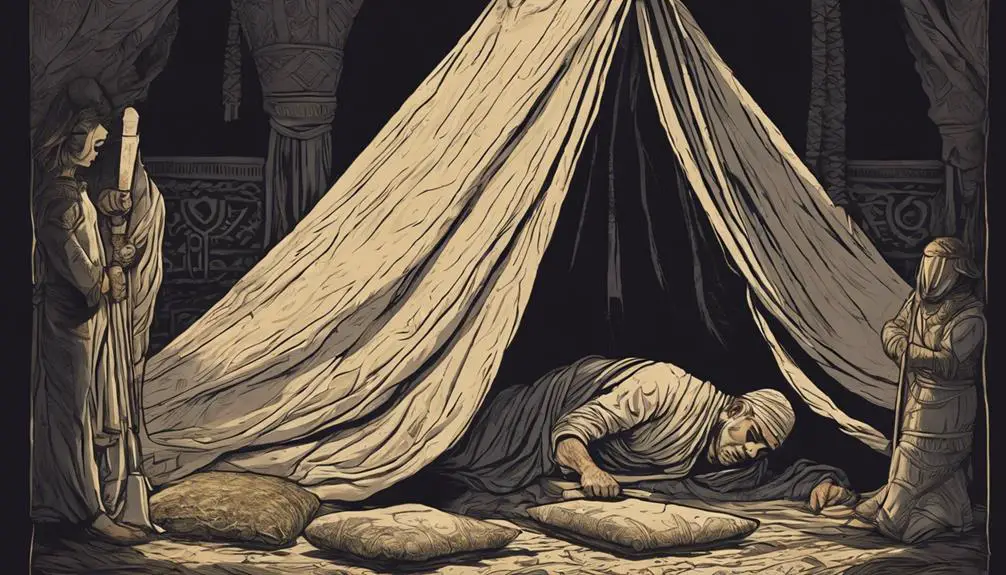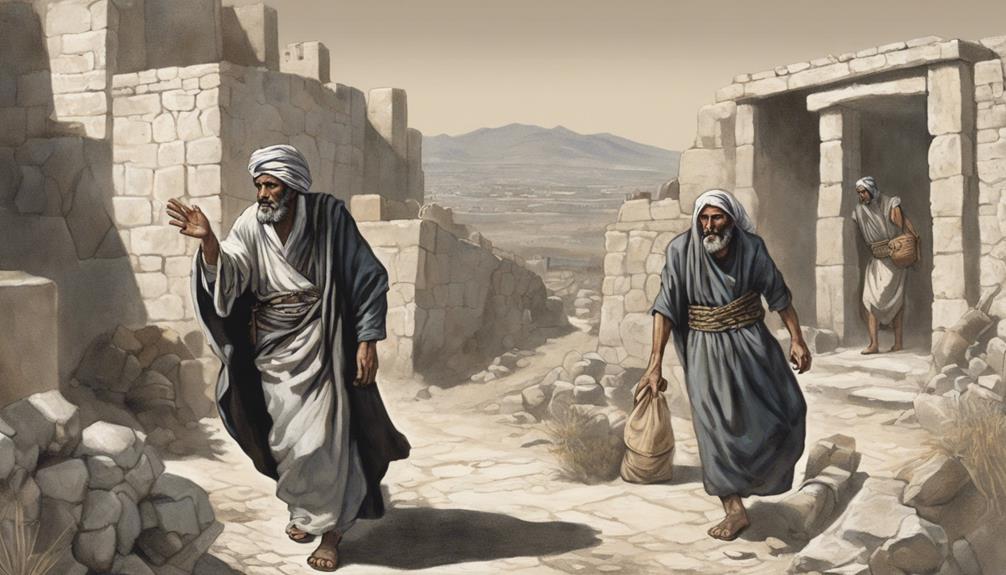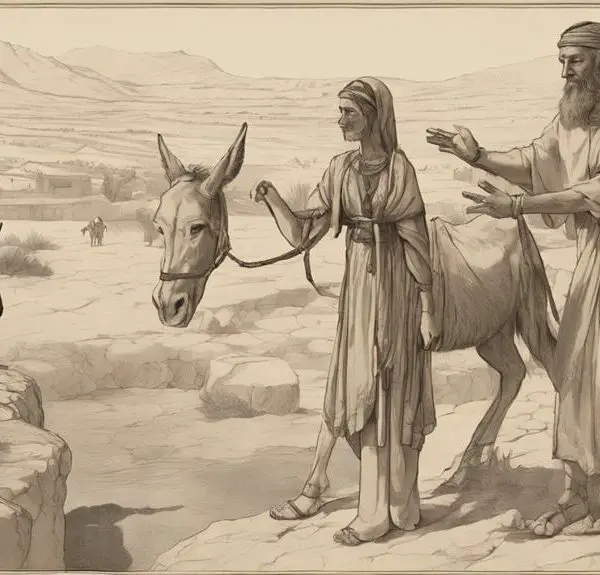Discover the mystery behind the Bible's accursed objects and their lessons on obedience and morality.

Accursed Things in the Bible
Have you ever pondered why certain objects in the Bible were labeled as accursed? Throughout the scriptures, specific items were deemed forbidden or accursed, often leading to dire consequences for those who disobeyed.
From the infamous Forbidden Fruit that set the stage for mankind's fall, to Achan's sinful plunder causing defeat for the Israelites, these narratives not only captivate but also serve as stern warnings.
As we explore these tales, consider the underlying lessons they impart about obedience, faith, and the profound impact of seemingly simple choices. What might these ancient admonitions reveal to us today, and how could their echoes influence our understanding of morality and divine decree?
Key Takeaways
- Accursed things often symbolize disobedience to divine commands, leading to severe consequences.
- Coveting or taking accursed items can result in individual and community suffering.
- Idolatry and breach of faith, as exemplified by the Golden Calf, are considered accursed actions.
- Spiritual and moral integrity is compromised when engaging with accursed things, highlighting the importance of divine obedience.
The Forbidden Fruit

While the concept of the Forbidden Fruit isn't explicitly named in the biblical narrative, it's pivotal in understanding the genesis of human disobedience and its profound implications on morality and sin. This symbolic element encapsulates the very moment when humanity steered away from divine will, through Eve's temptation and the Serpent's deceit. The narrative, dense with allegorical significance, invites you to dissect the layers of meaning behind the act of defiance that led to the fall of man.
Eve's temptation isn't just a tale of curiosity; it's a profound exploration of the human condition, illustrating our susceptibility to persuasion and the catastrophic consequences of yielding to temptation. The Serpent's deceit, on the other hand, symbolizes the external forces of evil that perpetually seek to undermine divine order and moral integrity. Together, they craft a narrative that's as much about the inception of sin as it's about the enduring battle between good and evil within the human heart.
This story, foundational to Christian doctrine, emphasizes the weight of choices and their ripple effects on the fabric of moral and spiritual life. It serves as a cautionary tale about the perils of disobedience and the eternal quest for redemption.
Achan's Sinful Plunder

Achan's act of taking forbidden spoils from Jericho represents a pivotal moment of disobedience and its grave consequences in biblical history. In this narrative, you'll discover how Achan's clandestine acquisition of a hidden treasure—a mantle from Shinar, silver, and a wedge of gold—triggers divine punishment, illustrating the severe repercussions of defying God's command.
This incident underscores a profound lesson on the sanctity of divine instructions. When Achan conceals these items in his tent, he not only disobeys a direct order but also endangers the entire Israelite community. His actions lead to a devastating defeat for the Israelites at Ai, highlighting the communal impact of individual sin. It's a stark reminder that personal greed can have far-reaching effects, beyond the immediate circle of the transgressor.
The divine punishment meted out to Achan and his family serves as a chilling testament to the seriousness with which God views the violation of His commands. The story of Achan's sinful plunder warns against the temptation to seek personal gain at the expense of collective well-being, emphasizing the importance of adherence to divine law over the allure of hidden treasure.
The Golden Calf

Similar to Achan's transgression, the creation of the Golden Calf represents another profound breach of faith, underscoring the Israelites' struggle to adhere to divine commandments amidst trials. This incident vividly illustrates the severe idolatry consequences that befall those who deviate from worship prescribed by God. You'll find that this act wasn't merely a lapse in judgment but a deliberate defiance against the very essence of their covenant with Yahweh.
The narrative surrounding the Golden Calf is a stark reminder of how quickly faith can erode when faced with uncertainty or when God's presence isn't immediately tangible. The Israelites, feeling abandoned during Moses' prolonged absence on Mount Sinai, sought to create a tangible deity, thereby deviating from monotheistic worship. This Worship deviation wasn't just a physical act of creating an idol, but a symbolic abandonment of their faith and trust in God.
The consequences of this idolatry were swift and severe, highlighting the gravity with which God views such transgressions. The incident serves as a critical study into the dynamics of faith, patience, and the peril of seeking immediate gratification over divine promise. It underscores the importance of unwavering fidelity to God's commandments, especially when faced with tests of faith.
Gehazi's Greed

In examining the narrative of Gehazi's greed, we encounter a compelling illustration of the perils that personal avarice poses to spiritual integrity and communal harmony. This story, deeply embedded within the biblical text, unfolds as Gehazi, the servant of the prophet Elisha, allows his greed to overtake his moral compass, leading to dire consequences. His actions and their repercussions serve as a potent cautionary tale about the dangers of covetousness.
Key aspects of this narrative include:
- Gehazi's Deception: He lies to Naaman to acquire gifts that Elisha had refused.
- Elisha's Knowledge: Elisha, through divine insight, knows of Gehazi's deceit.
- Gehazi's Punishment: As a direct result of his actions, Gehazi is stricken with leprosy.
- Elisha's Reaction: Elisha's response underscores the spiritual cost of Gehazi's greed.
Elisha's reaction to Gehazi's behavior is particularly telling. It not only emphasizes the gravity of Gehazi's transgression but also reflects the broader biblical theme that spiritual and moral integrity shouldn't be compromised for personal gain. Gehazi's punishment serves as a stark reminder that actions driven by greed can lead to irreversible consequences, both physically and spiritually.
Anathema of Jericho

Reflecting on the story of Gehazi's greed, we now turn our attention to the Anathema of Jericho, another biblical account that underscores the severe consequences of covetousness within a sacred context. The narrative of Jericho's fall is pivotal, illustrating Joshua's dilemma as he faces the challenges of adhering to divine commands amidst the spoils of war.
In this episode, the city of Jericho is declared anathema—devoted to destruction, with all its treasures consecrated to God. The stark prohibition against taking any of the accursed items underscores a profound spiritual principle: obedience to divine commandments transcends material gain.
Archaeological evidence sheds light on the historical context of Jericho, offering insights into the city's significance and the plausibility of its destruction. While physical remnants provide a tangible connection to the ancient world, they also invite a deeper consideration of the narrative's symbolic dimensions.
The anathema of Jericho serves as a cautionary tale, reminding us of the dire consequences of defying sacred decrees for personal enrichment. This account, rich in moral and theological implications, challenges us to reflect on the priorities that govern our actions and the sanctity of divine injunctions.
Frequently Asked Questions
How Do "Accursed Things" in the Bible Relate to the Concept of Sin and Redemption in Christian Theology?
In exploring how sin and redemption intertwine in Christian theology, you're delving into the heart of divine justice and moral agency. Sin represents a deviation from divine will, positioning you in need of redemption.
Redemption, then, is your pathway back to alignment with divine principles. This dynamic underscores your role as a moral agent, navigating between choices that either align with or oppose divine will, shaping your spiritual journey.
Can Individuals Today Still Be Affected or Influenced by "Accursed Things" According to Biblical Teachings?
You might wonder if ancient concepts can still impact or influence individuals today. Yes, they can, particularly through their cultural impact and psychological effects.
These ideas, deeply rooted in historical texts, shape societal norms and personal beliefs, affecting how you perceive morality and spirituality.
Understanding these influences allows for a deeper comprehension of how traditional concepts of sin and redemption continue to affect modern life, guiding actions and beliefs in nuanced ways.
Are There Examples of "Accursed Things" Outside of the Old Testament, Particularly in the New Testament or Other Religious Texts?
You're exploring whether cultural artifacts or mythological parallels to 'accursed things' exist beyond the Old Testament, particularly in the New Testament or other religious texts.
This inquiry delves into the broader spectrum of sacred narratives, examining how different cultures and religions perceive and depict objects or entities deemed cursed or malevolent.
How Have Interpretations of What Constitutes an "Accursed Thing" Evolved Throughout Christian History?
You've noticed that interpretations of controversial concepts have morphed significantly due to cultural shifts and evolving interpretation methods. Initially, literal readings dominated, but as history unfolded, more nuanced, symbolic interpretations emerged.
This evolution reflects broader changes in society's values and understanding. In essence, what was once deemed accursed has been reevaluated, illustrating the dynamic nature of religious interpretation and its adaptation to contemporary moral and ethical standards.
In What Ways Have Modern Scholars Reconciled the Existence of "Accursed Things" With Contemporary Understandings of Morality and Ethics?
You're exploring how scholars today mesh the concept of 'accursed things' with modern moral and ethical standards.
They delve into historical context, understanding these concepts as products of their time. Through cultural relativism, they argue that morality evolves, suggesting interpretations of 'accursed things' should too.
This comprehensive analysis helps reconcile ancient texts with contemporary values, showing how interpretations adapt over time to reflect current societal norms and ethics.
Conclusion
In analyzing these biblical narratives, you've ventured through tales of disobedience, idolatry, and greed, illustrating humanity's propensity to covet what's forbidden. These stories, from the allure of the forbidden fruit to Gehazi's insatiable greed, serve as pivotal lessons on the spiritual and moral consequences of pursuing accursed things.
They underscore a profound biblical principle: that deviation from divine commandments invariably leads to spiritual estrangement and turmoil, a timeless warning that resonates with ethical imperatives across cultures and epochs.



Sign up